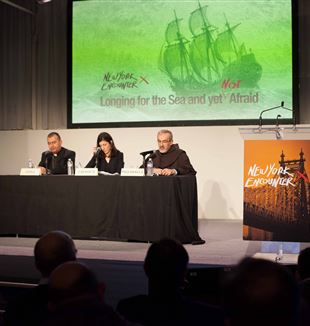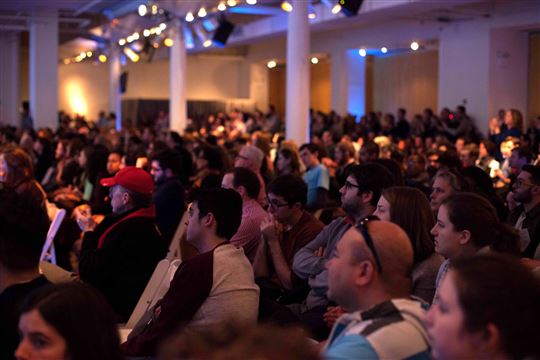
Your Love is Better Than Life: Christians
in the Middle East
Despite the rise of terrorism and Civil War in the Arab Spring, certainty and joy dominate local Christians. Archbishop Amel Nona and Fr. Pier Battista Pizzaballa shared stories of hope and freedom in the Middle East at the 2016 New York Encounter.In 2011, the Arab Spring gave the world great hope that a new age of freedom would issue into the Middle East, but in the years following, we quickly saw, instead, the rise of terrorism in both frequency and severity, devastating civil war, and millions of people fleeing their homelands. Looking at the many images on our daily newspapers of desperate refugees and destroyed cities, anyone keeping up with the ongoing events in the Middle East would be hard-pressed to characterize them with the words “joy,” “hope” or “freedom.” And yet, these are the words that tell the stories of Archbishop Amel Nona, former Archbishop of Mosul, Fr. Pier Battista Pizzaballa, Custos of the Holy Land, and their fellow Christians in the Middle East. Despite the grave hardships they face, it is remarkable to see that what dominates is the certainty and joy of their faith.
When Archbishop Nona began his term in Mosul in 2010, it was the most dangerous city in Iraq at that time. The city was left without a bishop for the previous two years because Nona’s predecessor had been kidnapped and killed. Furthermore, terrorists killed Nona’s best friend the year before. Dominated by fear, many of us might ask: why or how can one go on living in such a situation? But Nona suggested a different question that speaks of a new life and a new courage: how can one confront persecution on the basis of faith?
His resounding answer to this question throughout the testimony of his life in Mosul is that one can face persecution only with the joy and certainty in Christian life, which in turn allows one to live without fear. He recounted several examples of families who chose to walk long distances in order to go to mass, even when doing so put them at great risk of being kidnapped or killed. Under such dangerous conditions, these masses were full, sometimes even with standing room only. These events were great and beautiful for all of them present, because they “challenged fear with the joy of faith.” For Nona, it is impossible not to have courage in the face of such faith.
After recounting the experience of a woman who felt abandoned and alone in the face of persecution, Archbishop Nona, who faced the same persecution, wondered how a person could reach that point. He suggested that the problem is not the tragedies themselves, but on what foundation a person who faces them bases his or her life. Our current system of values, especially in the West, exalts freedom, but a freedom detached from truth and Christianity. Instead, “we cannot live as free people without being loving, without our Christian morals” that shape the way we “build all aspects of our lives—economy, politics, social relations, etc.” When we deprive freedom of the truth, it becomes an idol that cannot sustain any challenge. For this reason, Nona said, in order to help persecuted Christians, we must “say with courage that we are Christian and that we want a society that is Christian. When you declare with courage that you are Christian in all areas of life, from family to work, to politics, with strangers and friends—when you do that, you are helping the persecuted Christians.”
Fr. Pizzaballa faces different, though no less difficult, challenges in the Holy Land on account of the great religious diversity there. While he has little hope of finding reconciliation through dialogue among the faiths, he has seen progress when believers of different faiths share their lives and witness their experience of faith. For the Christians there, faith is such that, like those in Mosul, it allows them to face incredible challenges and to remain there, unafraid to be themselves. For example, when the Christians were forced to remove Christian symbols from their homes and churches, they didn’t allow the government to touch their symbols, taking them down themselves in order to ensure respect for the sacredness of the symbols of their faith. In addition, it is illegal to have alcohol in one’s home, but despite the risk of being caught with wine, Christian families take turns hiding it in their homes in order to be able to have mass; they do this because they cannot live without the Eucharist.
Fr. Pizzaballa also recounted the experience of his fellow Franciscans who remain in their parishes, in spite of the bombings of their churches, and continued violent persecution. He read part of a letter from Fr. Ibrahim, a fellow friar who, right after his church was bombed, testified “that God is present now even in the rubble of Aleppo, and the Lord will always bring more goodness even out of this evil for those who love him.” He continued confidently: “there is something beautiful [coming] for church of the East.”
Another friar in Syria was kidnapped in July, escaped with the help of Muslims, and then subsequently was kidnapped a second time just before Christmas. After being released Fr. Pizzaballa told him he had every right to leave, but the friar replied that he could not leave his people, and thus he returned. For other reasons, this friar now has to leave Syria, and the Order must decide whether to send another priest to replace him. When Pizzaballa posed this question to his fellow friars, the unanimous answer was “even if there are only two or three –[parishioners], we have to go. We cannot leave them, it is our duty our mission—we have to be present there even if we will be killed – we have to go.” Pizzaballa rightly pointed out throughout the recounting of these events that none of these actions can be taken for granted. They are movements of a people whose freedom rests on God and their faithful, loving relationship with Him.
We heard from an Iraqi Christian family now living in a refugee camp, and their testimony gave living breath to the faith we heard in the stories recounted by Archbishop Nona and Fr. Pizzaballa. Their words spoke for themselves. When asked who was Jesus for them, the mother of the family responded with a great smile and a deep sigh, “He’s my love, he’s my friend, he’s always with me. Wherever I go, speak, think, pray—he’s always with me. […] He’s always carrying us, sharing with us our dreams, our sadness, our happiness, everything! He is our life and leader, especially this family. He’s everything. He is our heart and I love him.” Based on the enthusiasm and joy with which she spoke these words, one would never believe that they were facing such tremendous hardship. This is the joy and freedom that mark Christianity.#NewYorkEncounter #MiddleEast